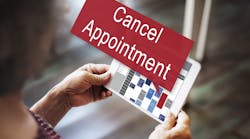The top 5 reasons your dental patients aren’t showing up
Editor's note: Sally McKenzie was a powerful voice in the dental industry until her passing in 2020. We're sharing this article in the spirit of having her high-quality and insightful work live on and continue inspiring readers. Read more about her legacy in the dental profession from Chris Salierno, DDS.
It seems like broken appointments and the chaos they bring are just part of running a dental practice. Just about every day, at least one patient doesn't show up or calls at the last minute to say he or she won’t be able to make the appointment after all.
The team goes into panic mode and tries to find someone to fill the open spot so the office can still meet daily production goals. Usually, the spot stays empty, which hurts practice production and the bottom line.
I’m here to tell you that it doesn’t have to be this way. While you’ll never completely eliminate broken appointments (life happens to everyone, after all) there are steps you can take to stop them from being a daily occurrence.
But first, you have to figure out why your patients are flaking out. Once you understand their reasons, you can put a plan in place to get more patients in the chair during their scheduled appointment times, reducing stress for everyone in your practice.
Here are the top five reasons patients cancel their appointments, along with a little advice to get them to make their appointments a priority.
They simply don’t see the value in dentistry
If patients are constantly skipping their dental appointments, chances are they don’t understand the importance of these appointments. That’s where education comes in.
When you have patients in the chair, take the time to educate them about why it’s critical for them to maintain their oral health. Talk with them about any problems you find and the possible consequences of ignoring these problems. Use videos, intraoral cameras, and radiographs to show them what you see. They’ll get it, and that means they’ll show up.
It’s also a good idea to keep the education coming even after the visit is over. Send out monthly newsletters with information about the services you provide as well as education about common dental health issues. You can also include educational materials with any bills you send in the mail. This all helps to keep dentistry top of mind and serves to remind patients just why they should keep their dental appointments.
There’s no sense of urgency
Patients tend to think they can put off dental care. They simply are not aware that skipping routine visits and delaying treatment—especially when many did just that during the worst of the COVID-19 pandemic—could lead to expensive, painful problems down the road. Again, that’s where you and your team members come in. Make patients understand what can happen if they ignore problems or slack off on prevention. Create a sense of urgency and they’ll be more likely to show up.
This goes for hygiene as well. Train your hygienists to talk with patients about the oral-systemic link. Once patients understand that, their dental appointments will move up higher on their priority lists.
They don’t realize what-all goes into every appointment
Most patients don’t put much thought into what happens during their dental appointments. That means they have no idea how much work it is or how much it sets your practice back when they cancel at the last minute. To show them, I suggest you give patients a list to take home at the end of every appointment. This list should include all the services provided, a review of the hygiene evaluation, home care instructions, recommended treatment, and all the free products in their goody bag.
This might sound like a lot, but if you have a template set up it won’t take much time for a team member to put the list together, and it will go a long way in showing patients exactly what they get from every appointment, and why they shouldn’t cancel at the last minute.
Dear Patient: This is not "just a cleaning"
There’s no cancellation policy
If your practice doesn’t have a cancellation protocol, most patients won’t think twice about calling to tell you they’re not coming in. That’s why I suggest you create a protocol and communicate it with patients every time they make an appointment. Ask them to cancel at least two days in advance so another patient can see the doctor at that time.
They simply forget
Your patients have a lot going on in their lives, so it’s easy for them to forget about a dental appointment they made a few months ago. That’s why I suggest you send reminders to every patient at least a few days out.
Ask patients if they prefer to be contacted via email, phone, or text, then send them reminders via that method. If they see the reminder and know they have a conflict, they can give the practice a few days’ notice rather than just a few hours.
Broken appointments are stressful and costly. Taking the time to educate patients will help them see the value in their appointments and of maintaining their oral health, and that will make them more likely to show up.
Originally posted in 2019 and updated regularly







